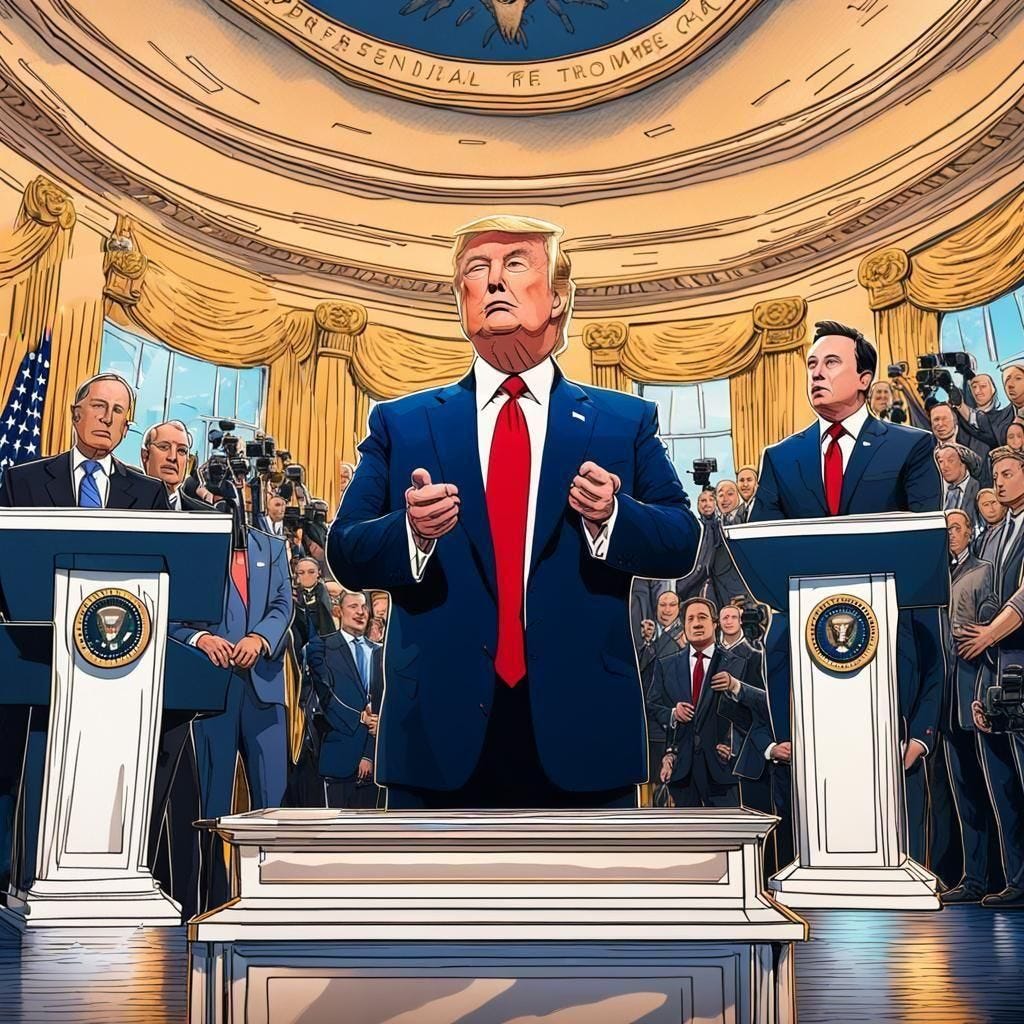Day 19,982: The Great Memecession
DOGE, Crypto. 700 words, 3 minute read. With Claude Sonnet.
The White House press room hummed with nervous energy as technicians adjusted their camera feeds for the fourth time. This wasn't just another presidential address – the markets had been jittery for days following rumors about the results of the Department of Government Efficiency commission.
Elon Musk stood slightly behind the presidential podium, thumbing through his phone with affected nonchalance. Cryptocurrency price tickers caught his eye every few seconds, each glance lasting a fraction longer than the last. Beside him, President Trump adjusted his tie, muttering to an aide about the lighting.
"Listen, the lighting – it needs to be perfect, okay? Perfect. Like when we did The Apprentice. Those guys knew what they were doing."
Vivek Ramaswamy shifted in his front-row seat, surrounded by binders bearing the seal of the Department of Government Efficiency commission. His tablet displayed an array of complex charts, each one more inscrutable than the last. He'd spent months crafting them to tell exactly the story they needed.
As the broadcast began, Trump approached the podium with his characteristic swagger. "My fellow Americans," he began, his voice carrying that unique mixture of gravitas and showmanship, "what we're about to announce – and believe me, many people are saying this – what we're about to announce will make America greater than anyone thought possible."
He paused, savoring the moment. "But first, I want to bring up my good friend, a true genius. Some say he's almost as smart as me." A ripple of uncertain laughter moved through the press corps. "The chairman of our great commission - he’s doing a great job, let me tell you - Elon Musk."
Musk stepped forward, his usual confidence tempered by something else – anticipation, perhaps, or anxiety. "Thank you, Mr. President." He cleared his throat. "When I accepted this position, many questioned whether a... what did they call me? A 'chaos agent' could bring order to government spending. Well, perhaps that was exactly what we needed."
He gestured to Ramaswamy, who scrambled to project his charts onto the wall. "First, we're eliminating several programs that have, shall we say, outlived their usefulness." Musk's lips twitched. "Electric car subsidies are going to be phased out for any car companies found to be acting against the interests of the MAGA agenda.” He paused as nervous chatter sounded throughout the room. “Additionally, we’re ending wasteful research - no more studies on whether gin or tequila makes fish more aggressive.”
Trump nodded, uncomfortable at not being the center of attention even for a moment. "But that's just the appetizer, folks," he interjected, reclaiming the podium. "We're about to solve a problem that nobody – nobody – thought could be solved. Our national debt. Thirty-six trillion dollars."
The room fell silent. Even the usually restless photographers stopped clicking.
"Through extensive consultation with our financial experts," Musk continued, his hand unconsciously checking his phone again, "we've developed a solution that leverages the power of AI and digital currency innovation." He paused, choosing his next words carefully. "A solution that will reset the game board entirely."
Trump stepped forward, his presence filling the space. "Therefore, by executive order, I am declaring Dogecoin to be equivalent to the United States dollar for all government debt obligations. All our creditors will be paid in full – in Doge."
Ramaswamy leaped to his feet, applauding with such enthusiasm that his tablet clattered to the ground. The screen cracked, distorting his carefully crafted charts into abstract patterns that eerily resembled crash indicators.
The next forty-eight hours unfolded like a dark comedy written by a nihilistic economist. Global markets didn't just plunge – they evaporated. Currency traders in London and Tokyo stared at their screens in mute horror. The dollar, yuan, euro, and pound sterling entered what financial historians would later call "The Great Memecession."
In his private office, Musk watched the chaos unfold on multiple monitors. For the first time since his PayPal days, doubt crept into his expression. He'd always believed that disruption was the path to innovation, that breaking systems was necessary to rebuild them better. But as he watched the global financial system unravel on the back of a de facto sovereign debt default, a new thought surfaced: perhaps some systems, once broken, couldn't be put back together.
His phone buzzed with a notification: Dogecoin had just hit zero.



